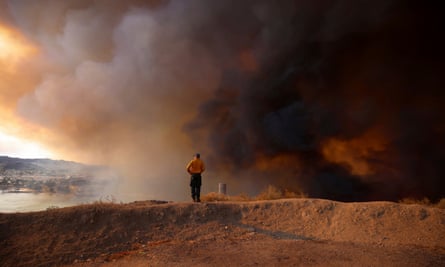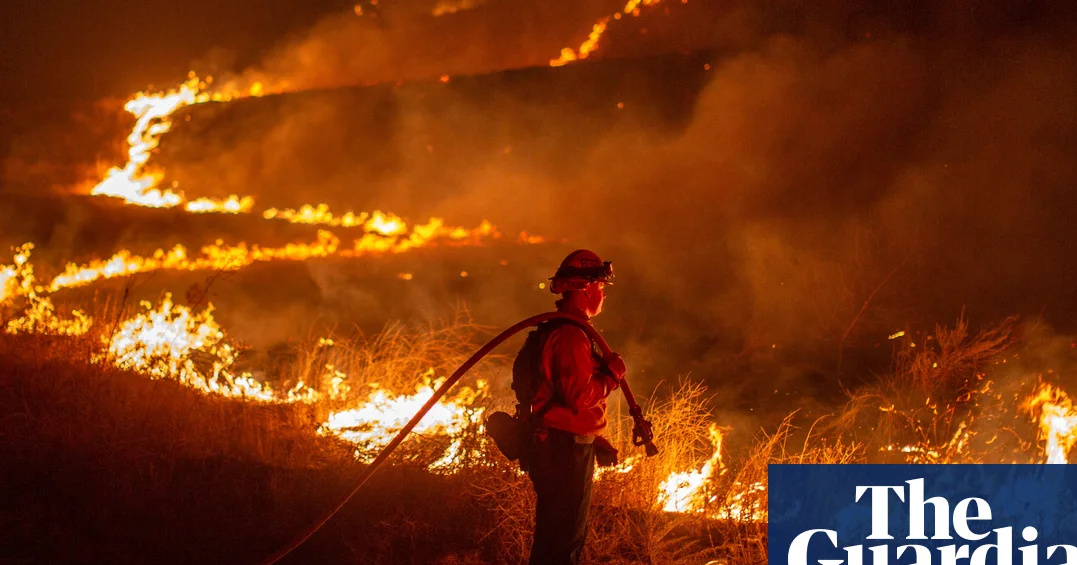Firefighters fought to maintain the upper hand on a huge and rapidly moving wildfire that swept through rugged mountains north of Los Angeles and resulted in more than 50,000 people being put under evacuation orders or warnings.
The Hughes fire broke out late Wednesday morning and in less than a day had charred nearly 16 sq miles (41 sq km) of trees and brush near Castaic Lake, a popular recreation area about 40 miles (64km) from the devastating Eaton and Palisades fires that are burning for a third week.
Though the region was under a red flag warning for critical fire risk, winds were not as fast as they had been when those fires broke out, allowing for firefighting aircraft to dump tens of thousands of gallons of fire retardant on the latest blaze. By Wednesday night, about 14% of the Hughes Fire had been contained.
Late on Wednesday, a new 40-acre brush blaze, dubbed the Sepulveda fire, started near Interstate 405 – the country’s busiest highway – as well the Getty Museum and the neighborhood of Bel-Air. By early Thursday morning firefighters said they had contained it.
“The situation that we’re in today is very different from the situation we were in 16 days ago,” the Los Angeles county fire chief, Anthony Marrone, said on Wednesday evening.
Red flag warnings were extended through 10am on Friday in LA and Ventura counties. Officials remained concerned that the Palisades and Eaton fires could break their containment lines as firefighters continue watching for hot spots.
An evacuation warning was issued for Sherman Oaks, where there was an approximately 10-acre (4-hectare) brush fire burning on the Sepulveda Pass near the I-405 freeway. The blaze was first reported just after 11pm on Wednesday.

A firefighter looks out towards Castaic Lake on Wednesday. Photograph: Ethan Swope/AP
More than 31,000 people have been ordered to evacuate from the Hughes fire, and another 23,000 are under evacuation warnings, the LA county sheriff, Robert Luna, said. There were no reports of homes or other structures burned.
Parts of Interstate 5 near the Hughes fire that had been closed reopened on Wednesday evening.
A 30-mile (48km) stretch of the major north-south artery had been closed for emergency vehicles, to move equipment and to prevent accidents due to smoke billowing across it. Crews on the ground and in water-dropping aircraft tried to prevent the wind-driven fire from moving across the interstate and toward Castaic.
Marrone said that because winds were not as strong as they were two weeks ago, aircraft crews were able to drop fire retardant on the south side of the fire, where the flames were moving, he said. More than 4,000 firefighters were assigned to the fire, he said.
Winds in the area were gusting at 42mph (67km/h) in the afternoon. They had reached as high as 65mph (105km/h) in some mountain pockets by Wednesday night, according to David Roth, a meteorologist with the National Weather Service.
Kayla Amara drove to Castaic’s Stonegate neighborhood to collect items from the home of a friend who had rushed to pick up her daughter at preschool. As Amara was packing the car, she learned the fire had exploded in size and decided to hose down the property.
“Other people are hosing down their houses, too. I hope there’s a house here to return to,” Amara said as police cars raced through the streets and flames engulfed trees on a hillside in the distance.
Amara, a nurse who lives in nearby Valencia, said she had been on edge for weeks as major blazes devastated southern California.
“It’s been stressful with those other fires, but now that this one is close to home it’s just super stressful,” she said.
To the south, Los Angeles officials began to prepare for potential rain even as some residents were allowed to return to the charred Pacific Palisades and Altadena areas. Gusty weather was expected to last through Thursday and precipitation was possible starting on Saturday, according to the weather service.
Associated Press contributed reporting
